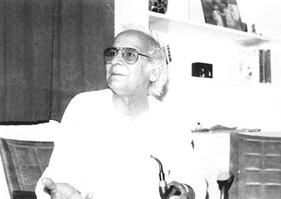Remembering
The dreamer - Sibte Hasan
21 years after his death, Sibte Hasan's commitment to the progressive cause is a source of inspiration for many
By Shahid Husain

In the death of Sibte Hasan on April 20, 1986, the progressive movement in Pakistan lost one of its best sons. Born on July 31, 1916 in Azamgarh, Uttar Pradesh, India, Syed Sibte Hasan was one of the activists who were contacted by Sajjad Zaheer, the doyen of progressive writers' movement in the subcontinent, to help organise Progressive Writers Association (PWA) amid great upsurge in the national liberation movement in undivided India.
Hailing from a family of landed aristocracy, Syed Sibte Hasan graduated in history from Aligarh University and went to Columbia University, New York, for higher studies. In 1942, he joined the Communist Party of India and worked as a full-time cadre at its headquarters in Bombay. He also edited 'Naya Adab', the PWA magazine published from Lucknow. He was also an assistant editor at the daily National Herald, India.
Syed Sibte Hasan's dedication to the progressive cause could be gauged from the fact that he resigned from the National Herald when Syed Sajjad Zaheer wrote him a letter asking him to join 'Qaumi Jang', the organ of the Communist Party of India published from Bombay and work as a full-timer on a meagre salary of Rs 30 per month. He lived in party headquarters where Rs 17 was deducted for food and Rs 5 for rent, leaving a paltry sum of Rs 8 to survive the entire month.
In May 1948 when he returned to Bombay from the United States he was told by Dr. Adhikari, the ideologue of the Communist Party of India, that an independent party has been established in Pakistan after partition and Syed Sajjad Zaheer has been elected its general secretary and he was also to leave for Pakistan. In July 1948, Syed Sibte Hasan arrived in Karachi and then left for Lahore where Syed Sajjad Zaheer was living in party headquarters.
Though Pakistan was conceived as a secular, democratic country by its founder, Mohammad Ali Jinnah, the feudal elements in Pakistan Muslim League started asserting themselves after the death of Jinnah in 1948 transforming the country into a protege of US imperialism and it became increasingly difficult for the progressive and democratic forces to survive in Pakistan.
In 1951, the communist leadership in Pakistan was implicated in the infamous 'Rawalpindi Conspiracy Case' and Syed Sibte Hasan, Syed Sajjad Zaheer, Faiz Ahmed Faiz, Mirza Mohammad Ibrahim, Dada Ferozuddin Mansoor, Eric Cyprian, Mohammad Afzal, Hasan Nasir, Major General Akbar Khan, Major Mohammad Ishaq, Captain Zafarullah Poshni, Hasan Abidi, were among those who were arrested.
In 1954, the government of Pakistan banned the Communist Party of Pakistan and Progressive Writers Association in order to woo the US leadership with which it had entered in military pacts in order to contain communism.
The communist movement was unable to recover from this blow even though Syed Sibte Hasan, Syed Sajjad Zaheer and other leaders were released in 1955. But it was a blessing in disguise for Syed Sibte Hasan who devoted himself to literary pursuits and wrote remarkable books such as 'Moosa Se Marx tak', 'Shehr-e-Nigaraan', 'Maazi ke Mazaar', 'Pakistan main Tehzeeb ka Irtiqa', 'Inqilaab-e-Iran', 'Naveed-e-Fikr', 'Afkaar-e-Taaza', 'Adab aur Roshan Khayali', 'Sukhan dar Sukhan', 'The Battle of Ideas in Pakistan', 'Mughani-e-Atash Nafas', etc.
He was editor of weekly 'Lail-o-Nahar', probably the best weekly publication in the history of Pakistan. 'Lail-o-Nahar' was initially published by Progressive Publishers Limited of Mian Iftikharuddin that also brought about two dailies namely Pakistan Times and Imroze. These publications were known for their high quality standards and professionalism until they were taken over by the government during General's Ayub Khan's martial law. In early 1970s weekly 'Lail-o-Nahar' restarted publication from Karachi, and Syed Sibte Hasan along with Faiz Ahmed Faiz were the editors. It discontinued its publication in 1971 when the military junta started a genocide in the former East-Pakistan (now Bangladesh) and it became almost impossible to write the truth.
Syed Sibte Hasan loved to mingle with the youth and enjoyed their company. In the early 1970s when a group of progressive young people in Karachi established Young Writers Forum, he patronised it and participated in its programmes.
In early 1970s he also brought about 'Pakistani Adab' along with short story writer Saeeda Gazdar from Karachi. In fact he left no stone unturned to inculcate progressive ideas among the masses, especially the youth whom he always advised to have a dream.
The impact of Sibte Hasan's books could be gauged from the fact that several editions of 'Moosa se Marx tak' and his other writings have been published but the demand for these books continues to soar. Interestingly, Sibte Hasan's books are in a greater demand in Balochistan and interior Sindh than in other places, indicating they have been a source of inspiration for the nationalist forces.
Syed Sibte Hasan created a furore when he started his polemical writings in defence of secularism in a major English daily that prompted eminent lawyer Khalid Ishaq to refute these articles from the point of view of the right. The polemical debate on secularism culminated into a new book by Sibte Hasan, 'The Battle of Ideas in Pakistan'. It encompassed subjects such as Secularism and its Falsifiers, Development of Secular Ideas and Practices in Ancient Societies (1), Development of Secular Ideas and Practices in Ancient Societies (II), State and Religion, Secularism in the East, Secularism in Egypt, Secularism in the Subcontinent, The Battle of Ideas in Modern Urdu Literature -- A Survey and Iqbal's Concept of Man.
Introducing the book, he wrote: "While the ruling class has employed every possible means to convert Pakistan into a theocracy, in blatant contravention of the spirit of the Pakistan movement and its total disregard of the declared wishes of her Founding Fathers, the people have rejected the claims of the Martial Law administrators to represent their will."
Syed Sibte Hasan's contribution to progressive literature in Pakistan has been wide-ranging. His writings continue to provide the basis for intellectual debates not only in Pakistan but in India as well. No wonder that his book 'Moosa se Marx tak' was reprinted by the Communist Party of India.
He was a soft spoken, loving person but never compromised on his principles. He was quick to disown the Adamjee Award on his excellent anthropological work 'Maazi ke Mazaar' because the award was associated with a leading capitalist of Pakistan.
Despite his failing health he was the moving force when the golden jubilee of Progressive Writers Association, which was celebrated in Pakistan in 1986. Later, he also went to India to participate in the golden jubilee celebrations there. He died on April 20, 1986 in Delhi of a heart attack leaving behind thousands to mourn the death of an era.

Equality, Fraternity, Social Justice
South Asian Peoples Forum UK
www.sapfonline.org info@sapfonline.org